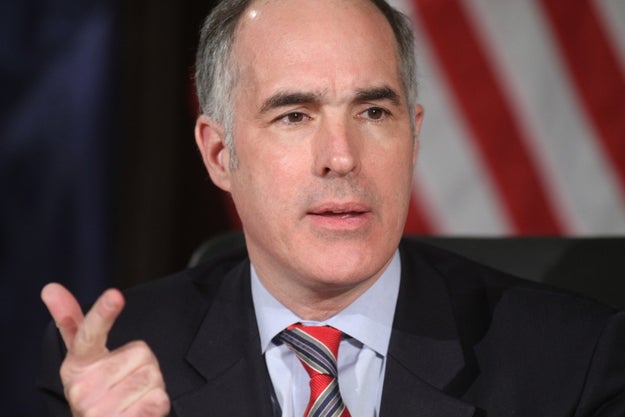[ad_1]

Sen. Bob Casey
Jessica Kourkounis / Getty Images
Two Democratic senators urged President-elect Donald Trump in a letter Thursday not to roll back key federal rules for how colleges are expected to respond to sexual assault cases involving students.
Sens. Bob Casey (D-Penn.) and Patty Murray (D-Wa.) sent a letter to Trump expressing concern about the possibility that his administration would rescind a 2011 Dear Colleague letter issued by the US Department of Education.
The 2011 letter clarified what the Education Department's Office for Civil Rights expects schools to do about sexual violence on their campuses to comply with the gender equity law Title IX. However, elements of the letter have been challenged by critics who said it removed or disregarded due process rights for accused students. Rep. Mark Meadows (R-N.C.) recently placed the letter on a list of regulations he wants to see Trump roll back, claiming it “virtually dictates one-size-fits-all procedures which provide less protection to the accused.”
“Campus sexual assault is a widespread problem affecting millions of college students across the nation, and institutions of higher education have struggled to respond even with the best of intentions,” Casey and Murray wrote in their letter, obtained by BuzzFeed News.
Murray is the third-ranking Democrat in the Senate, and both she and Casey are on the Senate HELP committee, which will be holding a confirmation hearing for Betsy DeVos, Trump's nominee for Education Secretary, on Wednesday.
The senators' letter was sent just as Vice President Joe Biden headlined the final event from the Obama White House on combatting campus rape.
“I’m working very hard with this incoming administration to convince them to understand that this is, in a sense, the civil rights issue of our time, the human rights issue of our time,” Biden said at the White House event.
Casey and Murray focus in their letter on the preponderance of the evidence standard that the Education Department says schools should use when deciding an accused student's guilt. Using the standard means school officials must decide they're more than 50% certain of someone's guilt, much lower than the beyond a reasonable doubt standard used in criminal courts when someone is facing jail or prison time.
“One of the most important pieces of the 2011 guidance clarified longstanding policy at the Office [for] Civil Rights, dating back to at least 1995 and explicitly supported by the George W. Bush Administration, that expects institutions to use the preponderance of the evidence standard of proof for conduct proceedings following a report of domestic or sexual violence,” the letter states. “The preponderance of the evidence standard is well established for violations of civil rights laws and civil court proceedings, and we believe this is the correct and appropriate standard to use.”
Documents from the Education Department show the administrations of Bill Clinton and George W. Bush both instructed schools to use the preponderance standard. Several former officials in the department's Office for Civil Rights told BuzzFeed News that prior to the 2011 Dear Colleague letter, it was known internally that the preponderance standard was expected in campus sexual assault cases.
However, the 2011 letter was the first time all schools nationwide were told to use it. The Foundation for Individual Rights in Education, a civil liberties group, is sponsoring a lawsuit against the Education Department for not allowing colleges to comment before issuing the guidance.
“We certainly were blindsided. Everyone I’ve talked to was blindsided,” Robert Shipley, executive director of the group, told BuzzFeed News. “Obviously that was part of the problem.”
Yet, higher education groups aren't necessarily pining to have the standard of proof in these cases raised. Makese Motley, a lobbyist for the American Association of State Colleges and Universities, said it makes schools “very nervous” to raise the standard because they also deal with sexual misconduct issues that might not rise to a criminal level.
“We would have huge concerns about changing the preponderance standard and raising it even higher,” Motley told BuzzFeed News. “That’s something that makes us very nervous, especially as public colleges. Maybe the conduct doesn’t rise to the criminal code or felony code, but may have been actions or conduct taken that still warrants [the accused student] being suspended.”
Casey and Murray were the original sponsors of the Campus SaVE Act, legislation included in the 2013 Violence Against Women Act reauthorization, that codified several portions of the 2011 Dear Colleague letter, but did not include the standard of evidence.
“We respectfully urge you to strongly support these efforts to end campus sexual assault,” the letter concludes.
LINK: What A Trump Presidency Could Mean For Combating Campus Rape
[ad_2]
